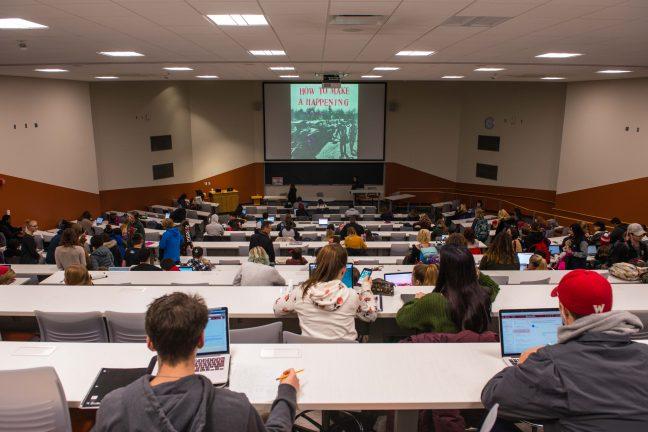Life for students at the University of Wisconsin will look a lot different this fall, especially as COVID-19 cases among undergraduate students rise during the first week of classes.
Effective Sept. 7, Chancellor Rebecca Blank sent out a message asking “undergraduate students to severely limit in-person interaction,” and restrict movement to essential activities only for the next 14 days. Mandatory masks indoors were extended to outdoor spaces on campus as well.
Sept. 9, Chancellor Blank announced students living in Witte and Sellery residence halls were being instructed to quarantine until Sept. 25, and beginning Sept. 10 almost all in-person courses shifted to remote instruction for the next two weeks.
UW spokesperson Meredith Mcglone released an email statement addressing the recent announcements.
“The move, in combination with a directive earlier in the week to significantly limit all undergraduate student in-person interactions, is intended to help curb a concerning and rapid increase in COVID-19 cases among our on- and off-campus students,” McGlone said in the email statement.
Because UW did not set forth guidelines for this fall until mid-July, many students were left to figure out their plans for the fall semester with limited information.
According to UW’s Smart Restart Guide, 45% of classes this fall have an in-person component, but classes will be completely virtual after Thanksgiving break. As per Blank’s Sept. 9 announcement, all in-person classes will be cancelled Sept. 10 to Sept. 12, and resume remotely beginning Sept. 14. for at least two weeks.
Students in these classes will be required to wear a face mask and maintain social distancing guidelines, according to the Smart Restart guidelines.
UW junior Na’ilah Ali decided to remain with her parents at home in Kenosha after she learned over the summer her campus job in the Center for Cultural Enrichment would be remote.
“I had thought that all of my classes were also going to be virtual, so I was like why can’t I just stay home and save money,” Ali said.
As the fall semester came closer, Ali, a violin performance major, realized she would have to drop a hybrid course with an in-person component, which she said was really frustrating.
Ali said she is going to try to stay on top of her coursework this fall, unlike during the spring semester when she lost her motivation after classes switched to online. Ali added she is going to work on being patient with professors who are new to doing classes virtually.
“I do miss when things were running smoothly,” Ali said. “Whereas now, there are all these technical difficulties making life a lot more stressful.”
For UW students who did decide to return to Madison, they arrived to a changed campus. The Shell and Nielsen Tennis Stadium were previously open by reservation only and at 25 percent maximum capacity, but Blank’s recent statement reversed that decision and now all campus gyms are closed.
Campus dining facilities are still closed to the public and all residence halls are closed off to non-housing residents, according to University Housing. Blank’s statement said residents will no longer be able to bring guests who live in other halls.
Campus community COVID-19 testing is in full operation at Henry Mall and the Fluno Center with mandatory random and voluntary testing, according to University Health Services.
UW senior Pablo Aquiles-Sanchez returned to an off-campus co-op in July after the shutdown in March. He said he felt the need to return in part because of an in-person discussion section required for his major.
But, Aquiles-Sanchez, a sociology major, said he is trying to be smart about his interactions on campus. He said he’s been careful about wearing masks and carrying hand sanitizer when he’s out in public.
“I literally just go to class and come back home,” Aquiles-Sanchez said, in order to do his part to protect his housemates.
UW senior Trinity Cross said she left her off-campus apartment in June but returned to Madison in August. Her concerns about COVID-19 stem from the fact that she has asthma, so if she became infected it would likely affect her more than other people.
Cross said seeing fellow Badgers in groups without masks makes her angry because she thinks it is reckless. According to the Wisconsin State Journal, at least 74% of the new cases since Sept. 1 came from UW.
Dane County, UW prepared to handle influx of COVID-19 cases on campus
“I used to just take walks all the time whenever I was stressed and that would help me relieve the stress, but now with [the virus], I’m a little scared to just go out and walk, even with a mask,” Cross said.
Cross, who majors in communication arts and human development and family studies, said she has one in-person discussion section in the Pyle Center this fall that now is online for the next two weeks.
Like Aquiles-Sanchez, she said the course was mandatory for her major, so despite her concerns, dropping it was not an option for her.
“I feel like if everyone really takes this seriously and gets tested and stays inside for the full two weeks, we might be better off,” Cross said.


